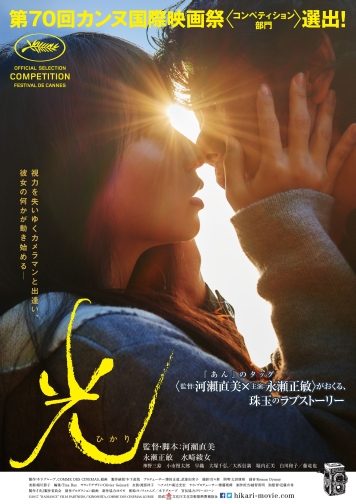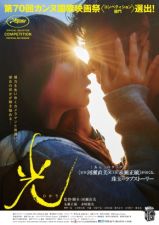Tuesday, October 03, 2017, 17:00 - 20:30
Special Screening of "Radiance (Hikari)" and Q&A in Collaboration with TIFF
featuring director Naomi Kawase, Japan Now advisor Kohei Ando and
TIFF Festival Director Takeo Hisamatsu
Tuesday, October 3

Japan Now panel: 5:00 – 5:40 pm
"Radiance" screening: 5:45 – 7:30 pm
In Japanese with English subtitles
Japan, 2017 101 minutes
Q&A session: 7:35 – 8:05 pm
The Film Committee is pleased to once again welcome our friends from the Tokyo International Film Festival (TIFF), along with Cannes Film Festival favorite Naomi Kawase. Joining the award-winning director to discuss highlights of this year's TIFF, which marks its 30th anniversary in 2017, is new TIFF Festival Director Takeo Hisamatsu and Japan Now advisor Kohei Ando.
Kawase will also appear for a Q&A session following our special screening of "Radiance," her fifth film to be selected for Cannes' official competition, a record for a Japanese director. She is being feted by TIFF for her contributions to the film industry and her work will be included in the festival.
Hisamatsu will discuss the new initiatives being unveiled for TIFF 30, and Ando will discuss the selections for TIFF's Japan Now section, which showcases outstanding Japanese films from recent and coming months, allowing international audiences to see local standouts with English subtitles.
The 30th TIFF will run from October 25 – November 3 in Roppongi, Ikebukuro and several other locations.
A luminous meditation on loss and salvation
"Radiance (Hikari)"
Writer-director: Naomi Kawase
Producers: Naoya Kinoshita, Masa Sawada, Yumiko Takebe
Starring: Masatoshi Nagase, Ayame Misaki, Tatsuya Fuji,
Kazuko Shirakawa, Misuzu Kanno, Mantaro Koichi
Film courtesy of Kino Films
For more (in Japanese): http://hikari-movie.com/
Naomi Kawase's fifth film in the Cannes official competition, "Radiance," is a luminous meditation on the power of art to transform our lives, whether it be alleviating our isolation from one another or showing us a future we are too shortsighted to recognize. "Nothing is more beautiful than what disappears before our eyes," says one of Kawase's characters, and the line serves both as a metaphor for the film's story and for cinema itself.
Misako Ozaki (Misaki) writes audio commentary for visually impaired filmgoers, and as Radiance"opens, her words are the subject of scrutiny from a focus group following a test screening session. The participants offer specific suggestions for improving her script, which is too wordy by far. Only one of them is downright rude about it. "It's intrusive," he barks, charges her with robbing them of their own imaginations and questioning her competence. He is Masaya Nakamori (Nagase) a famed photographer who has slowly been losing his sight. Fate will continue to bring the two together, and despite his abrasiveness, Misako will soon find that Nakamori is a kindred spirit.
Both are lost souls - she, since the disappearance of her father and the progression of her mother's dementia; he, as he loses his calling and his ex-wife prepares to remarry. Nakamori's photographs, taken on an ancient Rolleiflex (by avid cameraman Nagase himself), entrance Misako, particularly one of the sun setting behind the mountains. It will eventually solve a mystery from her past. As both emerge, tentatively, from the limbos in which they've been living, they learn to see the world through each other's eyes, and in Kawase's images, it is radiant.
Writer-director NAOMI KAWASE is acclaimed for a range of award-winning films, beginning with her Camera d'Or from the Cannes Film Festival for her feature debut, "Suzaku" (1997), the youngest filmmaker to win the award. She had already earned international attention for her documentaries "Embracing" and "Katatsumori," and she has continued to make documentaries alongside her narrative films. In 2007, Kawase won the Cannes Grand Prix for "The Mourning Forest," and received the Golden Coach lifetime achievement award in 2009. Her 6th film to be selected for Cannes, "Sweet Bean" (2015), marked her biggest box office success internationally. Kawase mentors young filmmakers through the Nara International Film Festival, which she founded in her hometown.
KOHEI ANDO is a professor emeritus at Waseda University, a filmmaker, a producer and a tireless promoter of international collaborations. He began making films under Shuji Terayama and continued creating short art films during a 30-year career with TBS. He has received many awards for his work, from such festivals as Oberhausen, Hawaii and Montreux, and was a pioneer in high-vision filmmaking. Ando's work is in collections at major museums and film libraries in Paris, New York, Los Angeles, London and Tokyo, and he has been the focus of two French retrospectives.
TAKEO HISAMATSU has spent nearly 40 years in the film industry and has served in many capacities, including as an executive managing director of Shochiku Co., Ltd. and deputy general manager of Warner Bros. Pictures Japan. In 2015, he established My Way Movies, where he serves as president. Over the past several years, Hisamatsu has produced such renowned Japanese films as "Unforgiven" (2013, directed by Lee Sang-il), "Rurouni Kenshin" (2012, Keishi Ohtomo), "Air Doll" (2009) and "Still Walking" (2008), both by Hirokazu Kore-eda and "All Around Us" (2008, Ryosuke Hashiguchi). Hisamatsu was named Festival Director of TIFF in 2017.
TOKYO INTERNATIONAL FILM FESTIVAL (TIFF) is the only Japanese film festival accredited by the International Federation of Film Producers Associations (FIAPF).* TIFF started in 1985 as Japan's first major film festival and has grown to become one of the biggest film festivals in Asia. Celebrating its 30th anniversary in 2017, TIFF continues to seek out excellent films from around the world and brings them to Tokyo, where filmmakers and film fans can enjoy them, meet emerging filmmakers, and be inspired.
Please make your reservations at the FCCJ Reception Desk (3211-3161) or register below. You may attend the Q&A session without attending the screening, but you will not have seating priority. Please reserve in advance, still & TV cameras inclusive. All film screenings are private, noncommercial events primarily for FCCJ members and their guests.
- Karen Severns, Film Committee
*FIAPF is an international organization that oversees issues related to the film industry and international film festivals.


